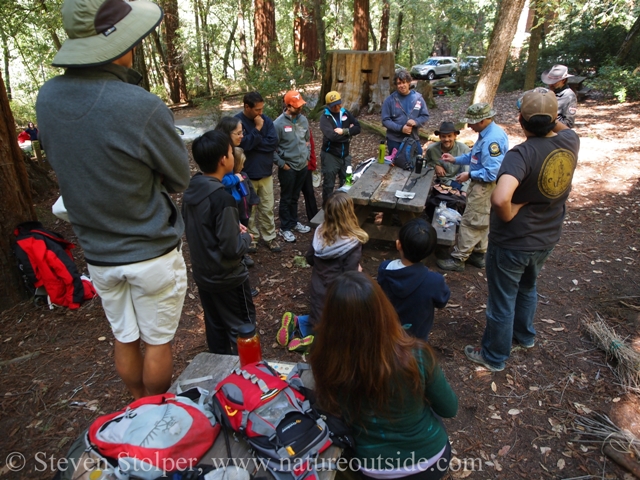
If you hike, bike, camp or ride horses, you should have a working knowledge of modern wilderness survival. Modern wilderness survival skills help you survive a short-term (1 to 3 days) survival situation.
But how do you learn these skills? One option is to take a wilderness survival class.
What is Wilderness Survival?
In modern times, if you become lost in the wilderness someone will eventually come looking for you. If you are in one of the lower 48 states, you can expect a search-and-rescue team to find you within 72 hours of when they start looking (statistically).
Their job is to find you. But it is your job to remain alive until they do! Modern wilderness survival techniques keep you alive during that 72-hour period. These skills use modern tools, materials, and knowledge.
This differs from bushcraft skills, which use natural materials to live for an extended time in the backcountry. It also differs from “traditional skills” that employ indigenous tools and techniques to subsist in the wilderness.
Modern wilderness survival is about getting your butt out of a situation gone horribly wrong!
The Stakes are High
As a teenager, I dreamed of going to college… while I slept through math class! 😀
As a result, my math skills are not good. But I have managed to lead a normal productive life even while being poor at math.
But learning wilderness survival is not like learning mathematics. It is more like taking flying lessons.
… learning wilderness survival is not like learning mathematics. It is more like taking flying lessons.
Picture yourself in the cockpit of a single engine airplane. There is no pilot! You are alone at the controls, thousands of feet above the ground. Your life and the lives of anyone else on the plane depend on your flying skills. Do you know what you need to land the plane safely?
When you find yourself in a wilderness emergency, your knowledge and training greatly affect the outcome. So it is vital to choose a high quality survival class. You want to have the skills to “fly the plane” when the time comes.
What should I learn in a Wilderness Survival Class?
As someone who teaches survival classes, I have strong opinions about what students should learn. But I was once a beginner myself. I remember my frustration trying to figure out which skills were important. It was difficult to figure out if I was getting a high quality education.
When it comes to learning survival skills you are your own “guidance counselor.” So here is my view of what makes a good survival skills education. Hopefully it can help you chart your course.
My Four Fundamentals
When I teach wilderness survival classes, I try to give students in each class “four fundamentals”:
When evaluating a class, try to figure out how many of the fundamentals it will give you. Then make a value judgment whether it is worth your time. Feel free to call or Email the class instructor and start a dialogue. Most instructors are happy to answer your questions and will provide insight into what you will learn and how they run the class. Bear in mind that many instructors are not as good with electronic technology as they are fire by friction. Take this into account if you contact them by Email.
Essential Knowledge
I believe that certain essential knowledge is mandatory for a high quality survival education. But not every class will offer an entire set of skills. You should expect to take several classes, with different instructors, to touch upon all of them. As you become more adept, you can take advanced classes that go deeper into each skill and introduce more complex techniques.
Here are the topics I believe are necessary for a well-rounded education using modern techniques:
Psychology of Survival
The mindsets, mental approaches, and coping strategies used by people who successfully survived wilderness emergencies.
Risk Assessment
You should learn how to assess potential hazards on a trip-by-trip basis. What are the dangers you should worry about most (likelihoods/impacts)? How should this affect your preparation, training, and behavior?
Priorities
You should learn a system of priorities to guide your actions during a wilderness emergency.
First Aid
If you go into the backcountry, you need the skills to treat sickness and injury.
Shelter
You should learn how to construct waterproof, windproof, shelters that maintain body temperature in a variety of environments, in a variety of weather conditions.
Water
Learn how to collect water from the environment and make it safe to drink.
Fire
Learn how to ignite and maintain a fire safely in a variety of weather conditions. Become proficient using fire for heat, to purify drinking water, and to signal for help.
Signaling and Self-rescue
Learn how to signal rescuers for help. Learn when and how to self-rescue.
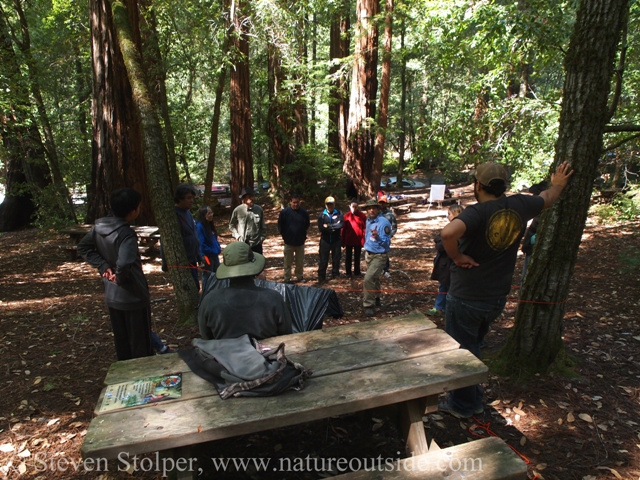
Making shelter is a fundamental skill
Two Common Approaches for Survival Classes
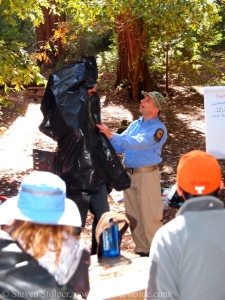
The latest in trash bag fashion. The course should let students experiment with new ideas, materials, and techniques.
I find most wilderness survival classes adopt one of two formats:
- A “relaxed” class that focuses on learning basic skills
- A “realistic” class that includes hardship and/or discomfort, uncertainty, stress, and fear
I prefer format 1 for beginners. I believe you should learn the skills in an environment that promotes learning. A relaxed, supportive environment is best for beginning students. Once you have a firm grasp of the basics, go ahead and take a class that introduces “realistic” conditions that include: cold, stress, discomfort, fear, and uncertainty.
One format you do not want is what I call “the indoor class outside.” Holding a lecture outside is not the same as a hands-on class that gives you experience performing important skills.
Selecting an instructor
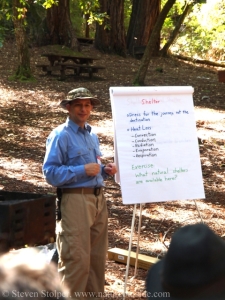
You want a teacher who can organize and present the material so you can understand it. This can be hard to find.
How do you know if your wilderness instructor knows his stuff? And how do you know he can teach it?
Ironically, when choosing a wilderness survival class, the student is left to fend for himself. There is no formal training required to teach a wilderness survival class. Nor are there certifications or standards for survival instructors. So how can you tell if a particular class will be worth your time and money? The honest answer is: you can’t!
But there are several steps you can take to learn before you buy. First, speak with the instructor, or the person who runs the survival school. Is he patient? Is his description of the class well-organized? Does the content of the class match your expectations? Does he sound enthusiastic about his subject? Don’t hesitate to ask about the instructor’s background and experience.
Another option is to ask for the contact information of three students who already attended the class. Try to speak with them over the telephone. If they don’t respond, that tells you something, too. You don’t have to call them all. But make sure to speak with the third name on the list. It is easy to find two buddies who love you.
Another approach is to seek referrals. Talk to park rangers, nature interpreters, and local SAR personnel. If you have contact with an instructor outside your area, contact him and ask if he can recommend someone local. I have obtained good referrals this way along with some candid information that saved me time and money.
Even Bad Classes can be Good
One class cannot make you an expert — at anything! Take several. Even if you get a bad class, you should still be able to learn something useful. Different instructors cover different topics. And they cover the same topics differently. You can still glean interesting nuggets of information when a new instructor covers subjects you have learned before.
Expert outdoorsmen often make poor teachers. I’m afraid that bad teachers come with the territory. But bad information should not! If you make an extra effort you can learn even from a poor instructor. But under no condition should you accept bad information! Bad information is hard for the beginner to detect. So be proactive. Double-check absolute statements or techniques that seem dubious to you. Be on guard for bad information!
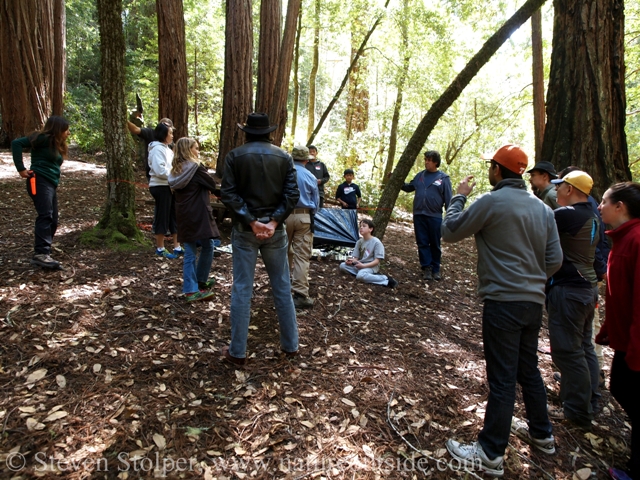
The most valuable classes give students the chance to use skills and get immediate feedback.
Your Most Important Survival Tool
What is your most important survival tool? It is your brain! It makes all your critical decisions in a survival situation. With modest resources, your brain can keep you alive through horrendous situations. So take the time to fill it up with good information!
And remember to have fun!
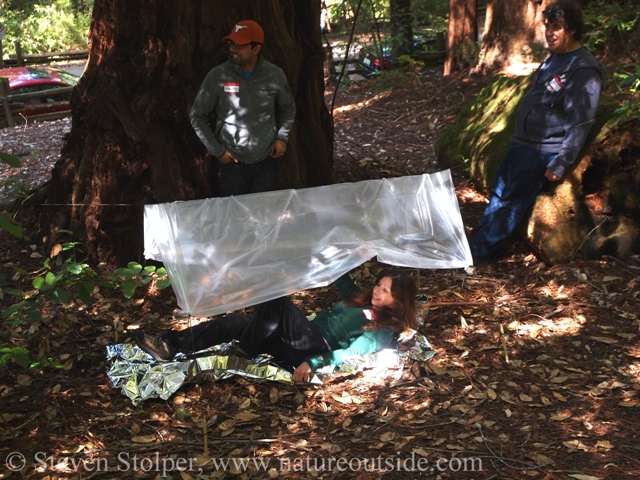
Students should be allowed to learn from mistakes (in class). There are consequences for placing your ridgeline too high.
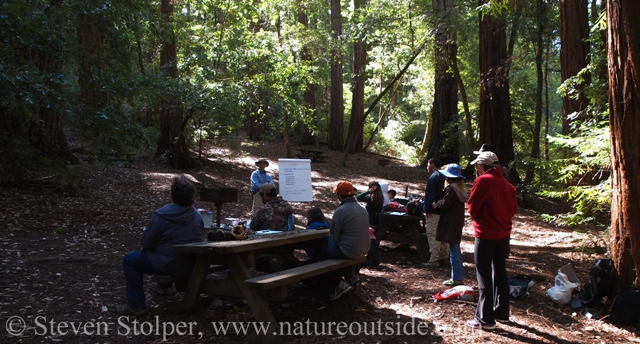
A beautiful location helps, too!
Related Articles on NatureOutside
Wilderness First Aid and the Duty of Care to Yourself
Maxpedition Individual First Aid Pouch
For fun facts and useful tips, join the free Bushcraft Newsletter.

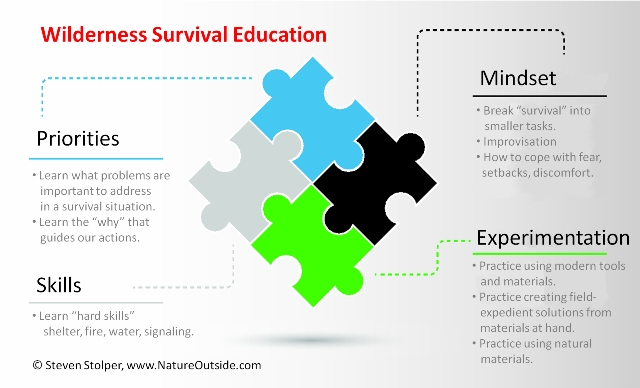


Thanks for resolving the conflict that was going on in my mind. You have solved a big question in a very simpler way. Thank you so much Steve.
Glad I can help, Lucia!
Nice article. If any person goes into the forest and forgot the way then they can not survive due to which they can die. So whenever any person goes into the forest, firstly they should be learned the survival training.
Thanks for your comment, Derrick! I agree it’s important to be able to look after yourself if you go into the forest. Something as simple as getting lost can become a survival situation if you are not prepared and trained.